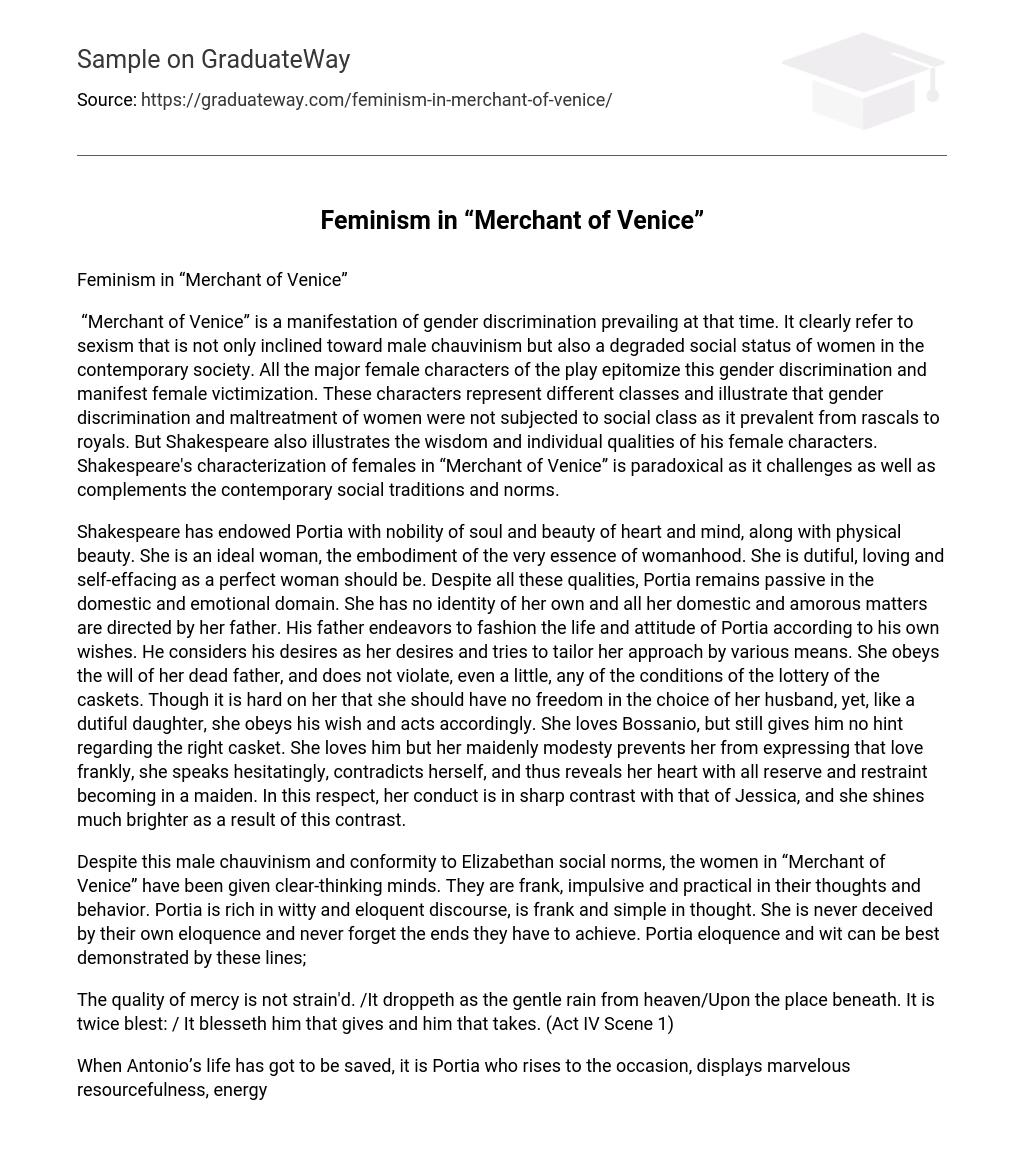“Merchant of Venice” is a manifestation of gender discrimination prevailing at that time. It clearly refer to sexism that is not only inclined toward male chauvinism but also a degraded social status of women in the contemporary society. All the major female characters of the play epitomize this gender discrimination and manifest female victimization. These characters represent different classes and illustrate that gender discrimination and maltreatment of women were not subjected to social class as it prevalent from rascals to royals. But Shakespeare also illustrates the wisdom and individual qualities of his female characters. Shakespeare’s characterization of females in “Merchant of Venice” is paradoxical as it challenges as well as complements the contemporary social traditions and norms.
Shakespeare has endowed Portia with nobility of soul and beauty of heart and mind, along with physical beauty. She is an ideal woman, the embodiment of the very essence of womanhood. She is dutiful, loving and self-effacing as a perfect woman should be. Despite all these qualities, Portia remains passive in the domestic and emotional domain. She has no identity of her own and all her domestic and amorous matters are directed by her father. His father endeavors to fashion the life and attitude of Portia according to his own wishes. He considers his desires as her desires and tries to tailor her approach by various means. She obeys the will of her dead father, and does not violate, even a little, any of the conditions of the lottery of the caskets. Though it is hard on her that she should have no freedom in the choice of her husband, yet, like a dutiful daughter, she obeys his wish and acts accordingly. She loves Bossanio, but still gives him no hint regarding the right casket. She loves him but her maidenly modesty prevents her from expressing that love frankly, she speaks hesitatingly, contradicts herself, and thus reveals her heart with all reserve and restraint becoming in a maiden. In this respect, her conduct is in sharp contrast with that of Jessica, and she shines much brighter as a result of this contrast.
Despite this male chauvinism and conformity to Elizabethan social norms, the women in “Merchant of Venice” have been given clear-thinking minds. They are frank, impulsive and practical in their thoughts and behavior. Portia is rich in witty and eloquent discourse, is frank and simple in thought. She is never deceived by their own eloquence and never forget the ends they have to achieve. Portia eloquence and wit can be best demonstrated by these lines;
The quality of mercy is not strain’d. /It droppeth as the gentle rain from heaven/Upon the place beneath. It is twice blest: / It blesseth him that gives and him that takes. (Act IV Scene 1)
When Antonio’s life has got to be saved, it is Portia who rises to the occasion, displays marvelous resourcefulness, energy, determination and practical ability, while her Lord and Master can do nothing but stand helpless and talk. She arranges all the necessary details with an almost masculine self-confidence and practical commonsense. She conducts the case with perfect ability and ease. All take her to be a clever lawyer. She leaves Shylock no loophole for escape and uses he trump card only when he has shown himself entirely merciless and brutal.
Jessica also plays an important role in the drama. She helps in the progress of story. But her role is in stark contrast to that of Portia’s. She is in a sense a foil to Portia. She is undutiful and treacherous towards her father, killed him by stabbing him on his back, while Portia is a dutiful daughter who obeys the wishes of her father to the very latter. In the conduct of her love affair, Jessica is bold and forward, indiscreet and unmaidenly. It is she who proposes the elopement, and arranges for it. Portia’s conduct towards Bossanio, on the other hand, is right and proper, such as is desirable in a maiden. Jessica’s home was like a “hell” to her, where she is denied of all freedom and all pleasure. Life in such a home would be intolerable for any one, and so Jessica may be excused if she revolts and elopes with Lorenzo whom she truly loves. So women characters are an epitome of traditional feminist expressions of the age that require chastity, compliance and acceptance of male dominancy from women. Additionally Shakespeare further induced a spirit of individuality in them by inculcating certain behavioural competencies and habitual formations in them i.e. intelligence, witticism, frankness and a passion to move ahead in life. Furthermore, women are portrayed with glowing colors and not negative terminology or abuses are attributed to them.
References
Shakespeare, William. Merchant of Venice. Penguin: New York. 2002.





